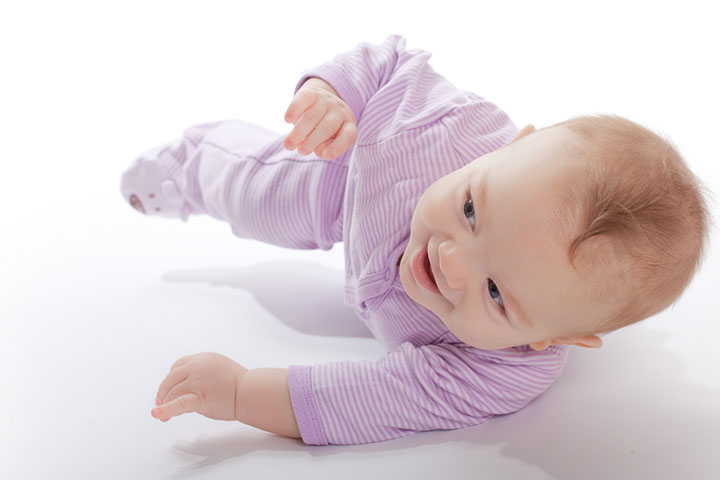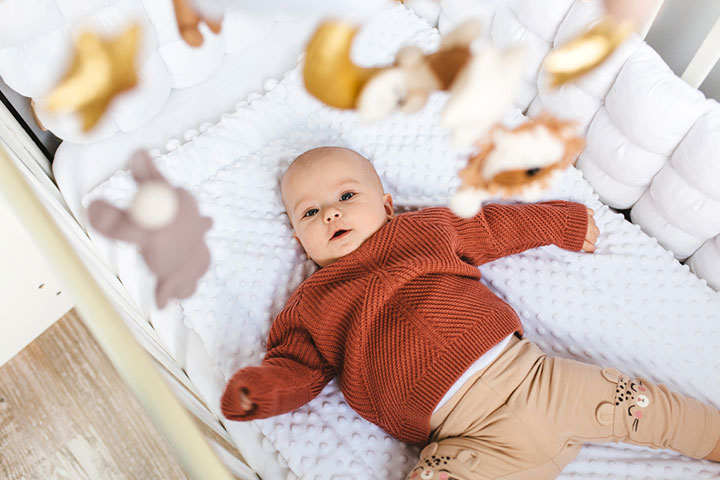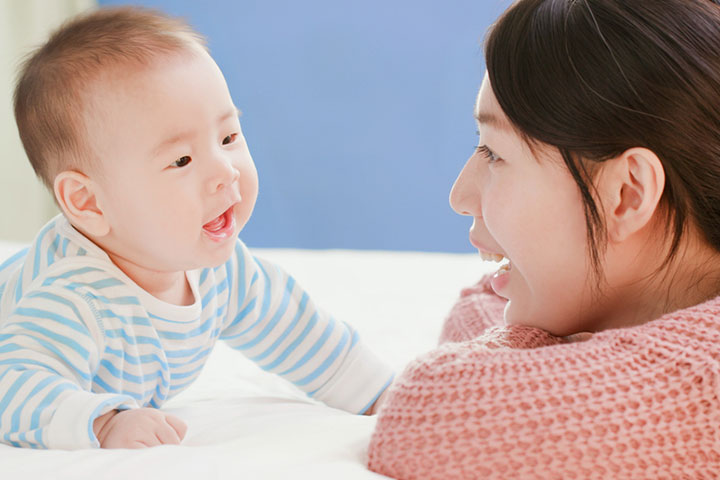Time has flown by, and it has already been four months since you brought your little bundle of joy home. This post on 4-month-old baby development milestones will give you an insight into their developmental traits.
Babies grow with each passing day, and by the time they are four months old, they are capable of doing many things. They can look straight into your eyes, recognize you, and even smile back at you. All these traits are just heartwarming and so joyful.
Read on to know more about the various developmental milestones that your newborn attains by the time they are four months of age.
A Four-Month-Old Baby’s Development Chart
| Achieved Developmental Milestones | Emerging Developmental Milestones |
|---|---|
| Responds to basic sounds and words | Learns to respond to his own name |
| Supports body with arms during tummy time | Can roll over from tummy to back |
| Smiles and laughs while looking at faces | Responds differently to specific facial expressions |
| Tracks nearby objects | Can track objects moving farther |
| Sits with support | Sits without support for short durations |
| Makes basic movements when on tummy | Begins to crawl when placed on tummy |
| Can hold toys with both hands | Passes toys from one hand to another |
| Cries differently for different feelings | Makes different sounds for different feelings |
| Pushes legs downwards while standing with support | Supports weight on both legs while standing with support |
| Watches new faces and objects keenly | Shows active curiosity towards new objects and people |
In addition to these basic milestones, your baby will learn several other skills.
A Four-Month-Old’s Developmental Milestones
Here we list the various cognitive, physical, and social and emotional skills that your four-month-old would achieve.
Cognitive Developmental Milestones:
Cognitive skills pertain to the baby’s intelligence, rationality and decision-making capabilities.
- Basic cause and effect understanding: When he is put in a feeding position, he opens his mouth in anticipation of food. He also reacts cheerfully when shown a toy indicating that he understands it is play-time. Babies now learn to draw basic connections between objects, individuals and situations. When it comes to individuals, memory plays an important role.
- Better memory: He now recognizes grandpa and possibly even recollects his last meeting with him. Your baby now has a definitive reaction towards objects and people he remembers. This could mean he may resist being held by certain individuals whom he dislikes. He will repeatedly choose one particular toy from a pile of toys thus indicating that he now has his favorites.
- Responds to affection: The little one now knows that when mommy kisses his cheeks it means she is showing love. Your four-month-old baby understands that he is the center of attention and responds accordingly every time you display affection. By four months, babies recognize the emotion of love especially when demonstrated by the primary caregivers (1).
- Lets you know when he is sad: If he understands love, he can also express sadness. A four-month-old baby will cry when a parent leaves the room for a substantial amount of time and will stop it when the parent returns. He expresses his feeling of sadness or missing someone by crying. This wail is usually a dry weep, wherein he does not shed tears but just throws a tantrum.
- Cries differently for different reasons:Crying is still the primary mode of communication for your 4 months baby. But now he has varying levels of wavelengths for it. Hunger, sadness, soiled diapers, each one has a differently toned cry. As a parent, you will soon recognize the different crying patterns.
Physical Developmental Milestones:
- Holds head steady: Heads up! Your baby now holds his head unsupported when held in arms. When he is picked up from a lying down position, he holds his head steadily in the direction he is being lifted. The neck muscles are stronger than they were a month ago, which means you are going to see more controlled and natural neck movements.
Brittany Dixon, mother of two, reports the same about her 4-month-old daughter. Gushing about her daughter’s development in her blog, this mom from Charlotte, NC, says, “I feel like Hailey has started learning new things every day. Her head control is pretty good and she enjoys sitting in the bumbo (i).”
- Stronger shoulder muscles: When placed on his tummy, he will push his elbows down towards the ground like getting into a plank position. The elbows are supported by the upper arms, which get their strength from the back muscles through the shoulders.
- Sitting with assistance: You can also make him sit on your lap or a soft surface while supporting him. You still need to hold him but he no longer topples over easily like he did earlier, indicating a substantial development in the lower back muscles.
- Speech development: Your baby is still young to understand the various nuances of language but you will see him make an effort to speak his first words. He now discovers his new found ability to use his voice and you would notice that he babbles simple rhythmic sounds (2). Infants at this age find it easier to say words beginning with M, D and B. This means you could experience the joy of hearing “Ma-Ma” and “Da-Da” very soon. Your baby may still not associate these words with parents, but you can reinforce it by repeating the word when he says it. Either way, he now does more than just cry!
- Rolling over: When placed on his tummy he will be able to roll over from tummy to back. That is a substantial growth in his physical development since it shows an increase in his range of movement. It is all due to stronger shoulder and back muscles that can now exert more force.
- Arm extensions: Stronger back muscles pave the way for stronger arm muscles. The baby is now capable of bringing both hands at a time to the mouth. You now notice that he extends his hand to grab a toy when it is in a reachable distance. When you hold him in your arms he may even throw his arms around you like a hug.
- Pushes down on legs when held straight: Your baby cannot stand but when you hold him vertically he will extend his feet all the way to the ground, like in a manner to stand. Earlier he would simply curl his feet up but he is now developing the natural reflex to push the feet down to stand. This growth forms a natural progression leading to crawling, standing, and walking.
- Larger tummy capacity: You may notice that your baby feeds for longer per breastfeeding session. But at the same time, he is hungry fewer times a day than earlier. A baby’s stomach has grown since the third month and is significantly bigger than it was in his first month. This means it can hold more milk, keeping him satiated for longer thus requiring fewer feeds.
- Improved eye control: By the age of four months, babies have better developed ocular muscles than they had a couple of months ago. Better ocular muscles coupled with stronger neck muscles mean the baby can move his gaze along a moving object. Wobble a toy around him and he will keep his eyes transfixed at it until it moves out of his field of vision. Babies at this age also look at faces carefully, especially the eyes. They have color vision since birth but high contrast objects like checkerboard patterns or eyes entice them the most. Don’t be surprised if he often plays a game of stare with you!
- Better motor skills: Place him in the crib with some dangling toys, and there are high chances he will reach out to a toy and rattle it. His hands are now quite dextrous since he has finer grip control than before. He can grab a handful of the object with improved precision and will maintain grip while moving the object. Long-haired moms beware! He is surely not going to let his grip loosen easily!
- Improved sleep: Your baby now sleeps in more solid blocks. This means he may, most probably, be sleeping for eight continuous hours probably at night. He may still wake up once in a while when he is hungry or has soiled his diapers, but it is now less sporadic and more predictable.
Kaleigh Carnahan, a mother of four from the Carnahan Fam YouTube channel, firmly believes in following a schedule. Speaking about her youngest son, she says, “Nelson is on an eat-wake-sleep cycle which means I wake to feed him at predetermined feeding times every day. We’ve done this routine with all four of our babies and because of that consistency, Nelson has been sleeping through the night for over a month now (ii).”
- Probably some teeth: Teething can appear in babies from the sixth month but it can start as early as the fourth month (3). The first teeth to appear are the lower central incisors, which are the front two teeth on the lower jaw. The emergence of the first teeth can vary and it is completely normal for a four-month-old baby to have no teeth. Therefore, do not be alarmed if your little one shows no pearly whites in his mouth.
Social And Emotional Developmental Milestones:
- Imitates others: One of the best ways four-month-olds respond to others is by imitating them, especially the sounds and expressions made by their parents (1). Look at him with a wide gaping mouth and there are chances he will gape back at you. Speaking to him with certain simple sounds will elicit a reaction in the form of a rudimentary imitation of the sound. It may be a simple act but is a strong indicator that the baby has started to understand the importance of verbal communication.
- Smiles and laughs: If you feel he just chuckled then he probably did. Babies begin to give those incredibly cute smiles and gurgle-like laughs from the fourth month of their lives. These smiles can be stimulated by anything that the baby finds amusing or cheerful like a laughing parent, a funny sound, etc. Laughter is often accompanied by an excitement that he may display by moving his hands and feet.
- Shows preference towards familiar people: You will see the first set of social skills in your little one at the age of four months. The baby’s behavior shows a preference towards people whom he recognizes, which means he remembers them. He will smile towards familiar faces even when they are standing at a distance. These are the first signs of social bonding.
- Enjoys play-time: Playing with your baby now seems more meaningful since he responds to the play rather than be a quiet spectator. He looks and smiles at a moving toy and understands that you are playing with him. It brings playtime a whole new meaning by making it social and interactive.
- Curious about others: A new face walks into the room and your baby just can’t keep his eyes off that person. If you hold him in your arms and speak to the stranger you may notice your baby turning his head to take a look at that person. He may even respond to the stranger’s smile with a smile. Babies develop a level of curiosity towards strangers as long as they are in a secure company of a parent. But if he is left alone with the unknown person he may panic and cry.
These developmental milestones are the ideal physical, mental and social achievements at the age of four months. If your baby does not show any of these it does not necessarily mean he has a problem or is lagging behind other infants. Just like adults, babies have personalities and may take their time to understand and learn various nuances of life. If he cannot do something today, he might do it the next week or perhaps the next month. It is just that he is taking his time.
When To Be Concerned?
However, you should be alert if you observe certain traits that could indicate serious developmental delays. Following are the important ones:
- Lacks coordinated eye movement, can’t move his gaze: The ocular muscles that control the eye movement are still developing, so there might be some lag in the movement of both the eyes. But if the baby has a serious lack of coordination and does not appear visually alert, then there could be a problem.
- Does not smile at all: Smiling is an important social activity and by four months, babies smile at least at their parents. If your baby has never smiled and seems socially detached even with you and your spouse, then you must get him checked by a doctor.
- Can’t hold the head steady: It is not normal for babies to have wobbly necks by the fourth month. By now, they should be able to hold heads steady when held in arms. If the baby is not able to do so, then it could be an indicator of a muscular or physical problem.
- Has stiff arms, hands, and legs: He should be able to bring hands to mouth, hold items and shake them and latch on to a finger or object when placed in his palm. When placed vertically, he will try to put his weight on his feet by exerting a force towards the ground. If his hands and arms seem stiff in general then it is definitely a red flag.
- Makes no sound at all: Babies make basic babbling sounds by the age of four months and may even make attempts at imitating words spoken by a parent. If your baby does not make a sound at all and in general seems silent then it could be an indicator of a hearing or speech problem. You must take your baby to a doctor if you notice something like this.
Remember that any developmental delay in your baby does not mean he has a problem. It could mean your baby takes time to learn and grasp new skills. But if your baby cannot do something that babies of his age generally can do, then the question arises “Why is he unable to do so?”. The answer could be less sinister than you may imagine, and it is best to leave it to the diagnosis of a certified healthcare medical practitioner. Besides ensuring timely vaccination schedules, there are always things you can do to prompt and encourage 4-month-old baby development by following certain best practices.
5 Parenting Tips To Improve The Development Of Your Four-Month-Old
- Speak to your baby as much as you can. He may not understand much but he definitely picks up basic words by what he hears from his parents (4). Your baby’s gibberish is actually his attempts to repeat the words and sentences that he heard his parents say. In some instances, babies also say simple words like ‘mama’ and ‘dada’. If he does so, encourage him to repeat the word. This will establish the sound and lip-tongue movement associated with that word.
- Refer to his toys and individuals around by their names or relations. This will teach him basic object-name association along with helping him learn new words. So the next time you give him a rattle say “Here is a rattle”. When grandma arrives, say “Look it’s grandma!” Point at the object or person to make the context of your sentence more definite for the baby.
- Make him sit in your lap and read him through brightly illustrated books. Bright colors and rich contrasts attract 4-month-old babies and will help improve his sense of vision.
- Have active playing sessions. Let your baby hold one end of the toy while you sway the other end. You can also move his hands gently while saying nursery rhymes. Movements like these will help strengthen the muscles and joints of the baby. Active play time is a great way for him to train his muscles to have smoother and controlled movements.
- Having tummy time regularly can improve the baby’s control on his neck and back muscles thus strengthening them. Place objects of interest and encourage your baby to reach out to them. This will be a great exercise even for his arm muscles. You can move the toys within his field of vision to make him move his neck along with the object that can improve his object tracking capabilities.
Once your baby reaches the four-month mark, you may notice several changes in their behavior. For instance, they can recognize you, respond to your voice, and display several basic motor skills and movements. Since babies are most attached to their parents during this time, you play a significant role in teaching new skills to them. Incorporate a healthy play and tummy time routine, read and talk to your baby, and introduce them to new people to help promote their social and memory skills. If you feel your 4-month-old baby has any developmental delays, take them to a pediatrician.
Key Pointers
- By four months, babies can recognize cause and effect, objects, individuals, situations and respond to affection and sadness.
- At this age, babies develop better eye control, motor skills, can hold their heads up, sit with assistance, roll over, and sleep better.
- Babies also show early social and emotional development by imitating, smiling, preferring familiar faces, enjoying playtime, and being curious towards strangers.
- If a baby lacks coordinated eye movement, doesn’t smile, hold their head steady or make sounds, a doctor’s visit is necessary.
- To aid development, parents can talk to their baby, refer to objects and people by name, read books, play actively, and encourage tummy time.
A side-by-side comparison of typical and atypical development in 4-month-old babies. Learn what to expect and how to spot potential issues.















